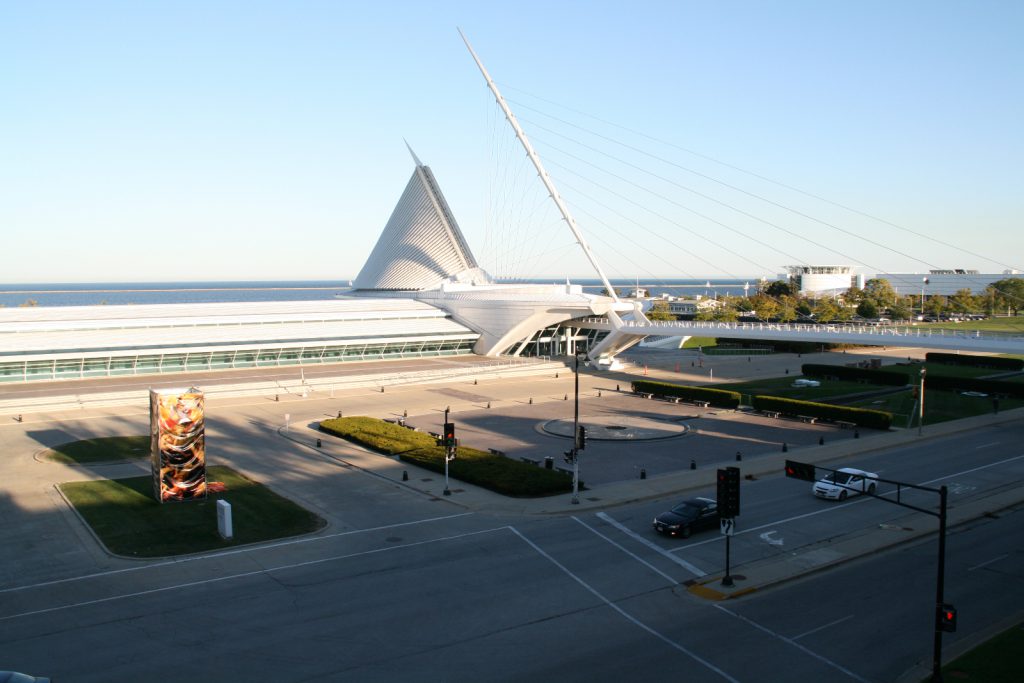Local Unions Confront The Wealthy
It's all about the wealth gap for workers at Colectivo and Milwaukee Art Museum.
The Milwaukee Art Museum has always been about wealth.
Its board of directors has always included many of the community’s wealthy people and is currently led by Quadgraphics CEO Joel Quadracci, who earned some $50 million over the last 10 years as CEO of Quadgraphics. Its collection of art has been built by many wealthy collectors, most famously by Frederick Layton and Peg Bradley, and the value of its collection is driven by what the wealthy will pay. And its budget depends on contributions from well-to-do philanthropists, who contribute millions every year to its support.
But even as millions flowed in to support the museum, it continued to depend on low-paid employees, many of whom worked less than full-time, which helped reduce the cost of employee benefits. The idea was that this was for a good cause — art with a capital A — and folks in the arts had long worked for low wages.
And then came the pandemic, with the museum’s low-wage workers seeing layoffs and reductions in hours. Finally, they had enough.
In August workers announced they were seeking to form a union. “We want to change ‘take it or leave it’ pay, poor communication, and a culture of privilege,” a statement by the union’s organizers declared. “With a union contract we hope to achieve a fair and transparent disciplinary process and, perhaps most importantly, ensure MAM will not take advantage of employees’ vulnerability during the ongoing pandemic.“
The statement added that “The vast majority of the museum’s employees of color work in the lowest paid jobs and were disproportionately impacted by the museum’s furlough.”
The effort came in the wake of other art museums in the nation becoming unionized and is very much about the class divide, as Art Net noted: “Art is a field in which some of the world’s wealthiest people regularly interact with artists and workers hovering near the poverty line. Because of this wealth gap, and because art institutions regularly celebrate critiques of capitalism and power abuses in art while failing to engage with the concerns of their own low-paid employees, unionization feels like a critical culture shift.”
But the MAM situation also echoed labor unrest in Milwaukee’s private sector since the pandemic hit. Employees at Comet Cafe picketed and demanded severance, and workers who were fired by Strauss Meatpacking after complaining about the lack of COVID-19 safety measures picketed the plant in Franklin. Then came union organizing efforts at the museum and Colectivo cafes, which were opposed by management of both local institutions. Colectivo even hired a law firm accused of “union-busting” to try to defeat the effort.
Scott Schwebel, vice president of brand, marketing and retail for Colectivo, was quoted saying that its workers would not benefit from a union because “transient employment cafe jobs get little or nothing in return.”
Laskonis forwarded screen shots of the company’s recent monthly emails to employees celebrating anniversaries and there were workers who’d been with the company 20, 18,11 and seven years and many who’ve been employed three or more years.
The reality is that millions of Millennials are making their living in these so-called transient jobs. They make up 59% of all workers for bars, hold 49% of all restaurant and food service jobs, 45% of jobs at alcoholic-beverage wholesalers and 42% of jobs in beverage manufacturing. Treating them like kids biding their time until they get a real occupation is an easy way to justify the low pay. Or the fact that a barista or bartender position is sexier than a dull office job.
But the net result is that the owners of Colectivo get wealthy while workers can barely support themselves. It’s a classic example of America’s wealth gap, which continues to hollow out the middle class while growing the wealth of the top one percent. But in the case of service industry companies like Colectivo, it adds a generation gap as well: Millennials are the low-paid servants of well-to-do Baby Boomers.
But it’s worth noting that the museum is tax exempt: we are all subsidizing it. And in the last 30 years nonprofit executive salaries have risen at a stratospheric rate, imitating those of private sector CEOs and helping create a wealth gap in the non-profit sector as well.
Those low salaries and jobs without benefits at the art museum have kept the overall budget much lower, making it easier for its philanthropists, who would otherwise have had to donate and raise more money. But they will get plaques and honors and wings of the building named after them. The hundreds of employees who subsidized the museum over the years will simply be forgotten.
While Colectivo is still battling, the art museum has lost the war, as its employees voted to form a union. The management, I’m told, was very angry. It will certainly add another challenge for the museum. But if art is to reflect the good, the beautiful and the true, shouldn’t its treatment of employees be informed by the same mentality?
More about the Union Effort at Colectivo
- NLRB Upholds Colectivo Union Election - Graham Kilmer - Mar 25th, 2022
- IBEW Local 494 Celebrates the Final Decision of the National Labor Relations Board (NLRB) on the Colectivo Coffee Workers Successful Unionization Campaign Effort - International Brotherhood of Electrical Workers Local 494 - Mar 25th, 2022
- Union Blasts Colectivo For Stalling Negotiations - Graham Kilmer - Jan 6th, 2022
- Union Bid At Colectivo Still On Hold - Erik Gunn - Dec 13th, 2021
- County Board of Supervisors Congratulate Colectivo Workers on Successful Union Election - Milwaukee County Board of Supervisors - Aug 27th, 2021
- Supervisor Czarnezki Calls on Colectivo Ownership to Bargain with Employees in Good Faith - Sup. Joe Czarnezki - Aug 27th, 2021
- Congratulations Colectivo workers - Milwaukee Common Council - Aug 25th, 2021
- Colectivo Workers Win Union Election - Graham Kilmer - Aug 23rd, 2021
- Colectivo Union Election Is a Tie Vote - Graham Kilmer - Apr 6th, 2021
- Colectivo Union Election Finishes - Graham Kilmer - Mar 31st, 2021
Read more about Union Effort at Colectivo here
More about the Union Effort at the Milwaukee Art Museum
- MAM Union Ratifies First Labor Contract - Graham Kilmer - Dec 23rd, 2021
- Murphy’s Law: Local Unions Confront The Wealthy - Bruce Murphy - Nov 30th, 2020
- Art Museum Workers Vote To Join Union - Graham Kilmer - Nov 16th, 2020
- Milwaukee Art Museum Won’t Recognize Union - Graham Kilmer - Sep 9th, 2020
- Art Museum’s Workers Organizing a Union - Graham Kilmer - Aug 10th, 2020
Read more about Union Effort at the Milwaukee Art Museum here
Murphy's Law
-
National Media Discovers Mayor Johnson
 Jul 16th, 2024 by Bruce Murphy
Jul 16th, 2024 by Bruce Murphy
-
Milwaukee Arts Groups in Big Trouble
 Jul 10th, 2024 by Bruce Murphy
Jul 10th, 2024 by Bruce Murphy
-
The Plague of Rising Health Care Costs
 Jul 8th, 2024 by Bruce Murphy
Jul 8th, 2024 by Bruce Murphy





















Solidarity!
Does anyone know the status of the labor contract between Milwaukee County Public Museum and the AFSCME union representing the workers there?